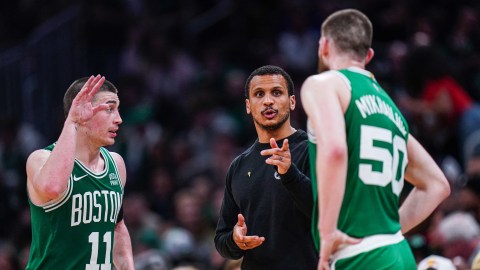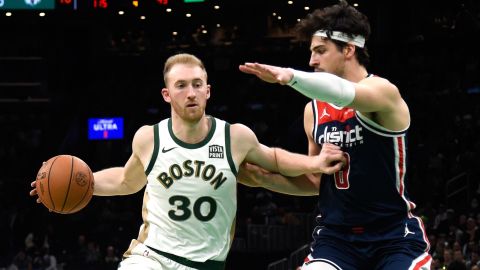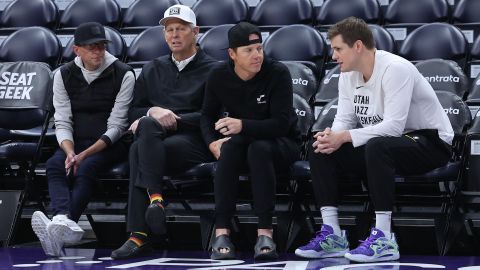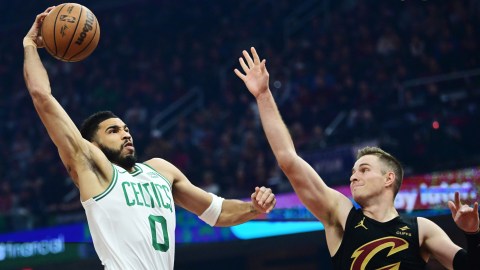 WALTHAM, Mass. — On a day that was supposed to be about Brad Stevens, Rajon Rondo dominated the room without even being here.
WALTHAM, Mass. — On a day that was supposed to be about Brad Stevens, Rajon Rondo dominated the room without even being here.
The top question on nearly everyone’s mind as the Celtics introduced the 17th head coach in franchise history was not how Stevens will handle the transition from the college game to the pros or what his new coaching staff will look like — although those things were asked, too. What everyone really wanted to know was how Stevens, the 36-year-old wunderkind with zero NBA coaching experience, would handle an irrepressible yet immensely gifted player like Rondo.
The four-time All-Star point guard was not in attendance on Friday, but not because his new coach wanted him to stay away. Stevens and Rondo spoke over the phone briefly, and Stevens gushed about Rondo’s abilities as he addressed the media at the Celtics’ training facility.
“I can’t wait to sit down with him, because he’s not only a really good basketball player, he’s also really intelligent,” Stevens said. “You can see that in his game. He’s got an intelligence, not only in about the way he plays, but also an instinctive ability to see the next play coming. You can see that on both ends of the floor. Combine that with a good competitive spirit and you’ve got what he’s been, and that’s a really, really good player, one of the best players in this league.”
Stevens should be eager to meet Rondo, because contrary to what has been speculated in the last few days, the coach holds all the leverage in their potential relationship. Since the Celtics announced Stevens’ hiring on Wednesday, most of the talk has revolved around whether Stevens could be able to keep the headstrong point guard in check. But all of that mistakenly assumes that Rondo holds the position of power. He doesn’t.
While the NBA is known as a player’s league and prominent clashes between players and coaches have typically ended with the coach quitting or getting fired, in this case, it is Rondo who has a vested interest in things working out between him and his new coach. The reasons have everything to do with where each of them is in their relative careers and the longevity of said careers if they hit a snag now.
For Stevens, despite leaving the equivalent of a lifetime contract at Butler, the stakes in Boston are relatively low. If he crashes and burns, then he slinks out of the NBA in disgrace, joins CBS or ESPN for a few years as a television analyst and returns to the college ranks on a massive salary to guide some high mid-major into glory. Win or lose with the Celtics, Stevens is guaranteed to make millions off his coaching insight for the next 30 years, barring some major scandal.
Look no further than Rick Pitino as an example. Pitino was eight years older than Stevens is now when he became Celtics coach in 1997. He left in the middle of his fourth disastrous season, went to Louisville and at last check was doing all right for himself. Similarly, Stevens will eventually recover, even if the Celtics completely unravel and he barks, “Paul Pierce is not walking through that door” during a postgame news conference.
Rondo’s position is far less advantageous. He already has something of a reputation for being tough to deal with, so much so that his attitude was partially blamed for the departure of his coach and at least one teammate. He is 27 years old and has two years left on the $55 million contract he signed in 2009, neither of which give him much stability as a professional athlete. If there is even a sense that he clashes with Stevens, fairly or not, he could get stuck with the dreaded “uncoachable” label that has done in many star players in the past. He could quickly go from a perennial All-Star making eight figures to persona non grata. If enough teams judge his talent to not be worth the cost, Rondo could find himself forced into an early and unwanted retirement.
Unthinkable? It shouldn’t be. Allen Iverson and Stephon Marbury were both better players in their primes than Rondo, and both were gone from the NBA by their mid-30s due to tainted reputations. Meanwhile, model teammates like Andre Miller and Derek Fisher still manage to find work as their 40th birthdays approach. People skills count for something once physical skills fall off.
There is no solid evidence at the moment that Stevens and Rondo will do anything but hit it off. As Stevens noted, Rondo is smart. He should know what it as stake.
They could get along famously (provided Rondo isn’t traded), exceed all expectations and raise banner 18 to the rafters together sometime in the next six years. Or they could lose, and it might have nothing at all to do with their relationship. Stevens is known as a great communicator and Rondo tantalizes people with the possibility he might grow up someday, so there is every chance this could be the beginning of a beautiful partnership.
In the event that it is not, however, do not mistake who will ultimately lose out the most. Coaching acumen seldom fades as coaches grow older, but athletic ability can disappear in an instant. Stevens will be just fine either way. Rondo is the one with more to lose.
Have a question for Ben Watanabe? Send it to him via Twitter at @BenjeeBallgame or send it here.



